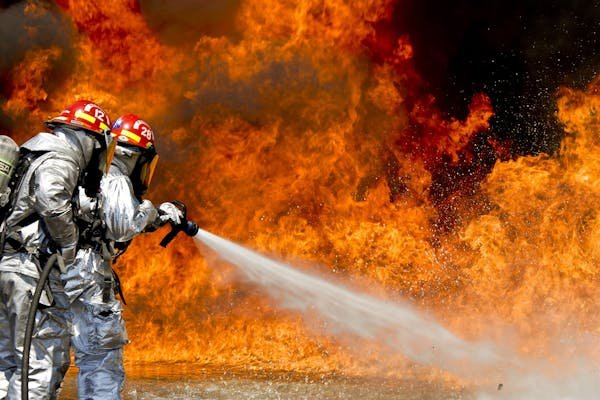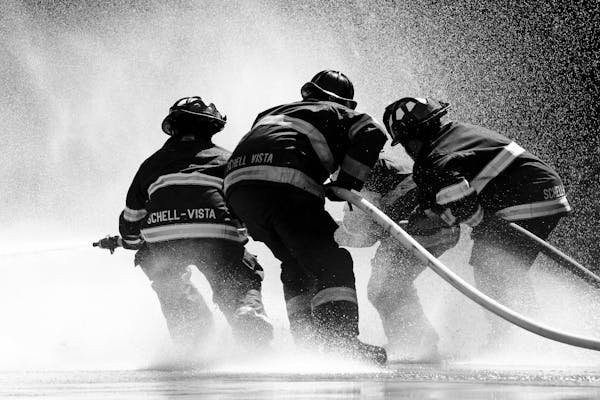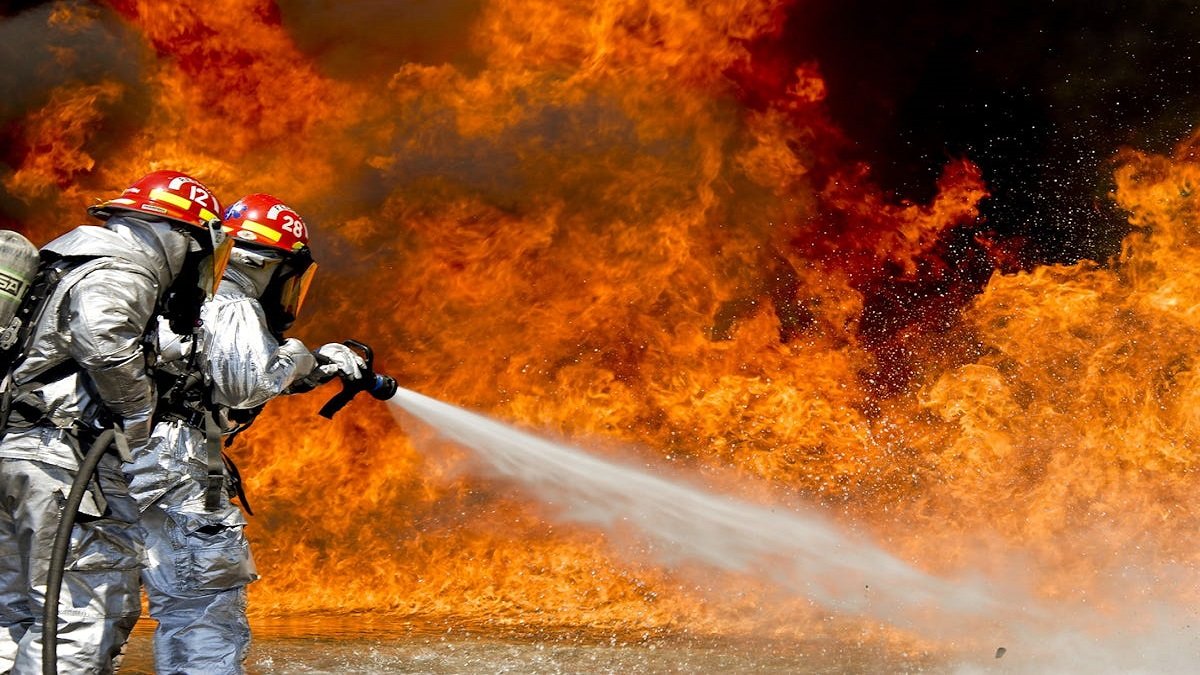Firefighter exam preparation requires a lot of dedication so preparation can be exciting and challenging at the same time. Aspirants of firefighters should be physically and mentally ready to do the things that this job demands and should have a mindset clear from the very beginning of the preparation with utmost dedication towards it.

The exam is structured in such a way as to test all the abilities of a person including their physical strength, cognitive thinking skills, and analytical along with problem-solving skills under a given amount of pressure to check whether they are eligible for the job role or not. Through this article, you will get to know what are the crucial steps in a firefighting career and how you can prepare for it.
Table of Contents
Understanding the Firefighter Exam Structure
The firefighter exam is divided into several parts with each portion checking and testing different aspects of your performance and readiness for the given job role. The portion includes the following things in it that are as follow:
- Written Exam
- Physical Ability Test (PAT)
- Oral Interview
- Medical and Psychological Evaluations
Each section has a specific purpose, so it is very important to know how to begin your preparation adequately at the right time.
1. Written Exam

The written exam is being conducted to test your cognitive skills along with reading comprehension, mathematics, reasoning and analytical thinking, and situation-based judgment. These areas are significant for firefighters because they need to make quick decisions with utmost accuracy in pressure situations.
- Reading Comprehension
The reading section of the written exam assesses your ability to understand and interpret things in the right manner without making any assumptions of your own. Firefighters have to read various manuals and comprehend them. They also read safety guidelines and various emergency procedures for which they need to have good reading and comprehension ability.
For preparing this portion, you should practice reading various texts and passages and try to answer the questions that focus on the main idea inference and specific details.
- Mathematics
A firefighter should know basic mathematics particularly he should be good at calculations as he needs to calculate hose length, water pressure, and other important statistics during the exam. The mathematics portion of the exam covers arithmetic, ration, and percentages. For preparing this you need to brush up your base focusing on problem-solving ability without using a calculator.
c) Mechanical Reasoning
Firefighter needs to work with various tools and equipment so the mechanical running portion of the exam is very important for them which tests their understanding of various mechanical concepts such as pulley, levers, and gear functions. Studying high school and intermediary-level physical concepts will be helpful in preparing for this section.
- Situational Judgment
This is a very interesting portion of the exam in which you will be presented with various hypothetical situations that firefighters face during their job and you will be required to choose the best course of action. Here to succeed you need to have sharp critical thinking and try to prioritize safety at every point. Start practicing various common firefighting scenarios and try to respond accordingly according to your understanding of the concept.
2. Physical Ability Test (PAT)

The physical Ability test (PAT) is one of the critical components of firefighting exam preparation. It is conducted to assess your physical strength, how much endurance you have, and agility at the same time. They must be in excellent body shape to perform the required tasks like carrying heavy weights, climbing ladders, and saving people from dangerous situations.
- Cardiovascular Endurance
Firefighters generally face situations that require sustained physical strength and effort like carrying hoses up multiple flights of stairs. By working on your cardiovascular endurance you can do these tasks easily and it is very essential to improve your cardiovascular strength. Try doing aerobic exercises such as running, jumping, cycling, and swimming. Incorporate these activities on a daily basis in your routine.
- Strength Training
Strength training is a must for firefighters as they have to lift heavy objects including injured individuals. So try to focus on building your both lower and upper body strength by doing weight training. Do exercises like squats, deadlifts, bench presses, and shoulder presses.
- Flexibility and Agility
Firefighters are required to navigate through tight spaces or move quickly in unpredictable environments. By doing flexibility and agility workout training such as yoga, dynamic stretching, and plyometric exercises one can improve their overall physical readiness for the test.
3. Oral Interview

And comes the oral interview which is done to test your communication skills, problem-solving ability, and your personal qualities, and how you present yourself among others. At the time of the interview, you may asked about your source of motivation and passion for becoming a firefighter, and how you handle stress under pressure. Also, they are interested in knowing how you will respond to specific emergencies.
- Practice Common Questions
For preparing Oral Interview, start practicing common questions such as:
- Why do you want to be a firefighter and what is the reason behind becoming that?
- How do you handle stressful situations and what strategy do you follow for it?
- Can you describe a time in your life when you worked in a team and what was your role in that team?
You should be able to articulate clear and concise answers for the interview. For this, consider practicing with your friend and recording yourself to refine your response.
- Showcase Your Soft Skills
Firefighting is not only about physical strength but at the same time it is also about teamwork, communication, and empathy. Take the interview as an opportunity and highlight these mentioned skills by sharing relevant experiences from your personal or professional life which will create an impact on the interviewer.
4. Medical and Psychological Evaluations
Firefighting is both a physically and mentally demanding job, for which you need to have good health so that you can tackle things easily. The medical and psychological evaluations are made to check that you are fit for handling the rigors that are required in this job.
a) Medical Examination
The medical exam tests your overall health including your eye vision, hearing ability, and cardiovascular fitness. So it is very important to maintain a healthy lifestyle so try to include regular exercise and have a proper balanced diet.
b) Psychological Evaluation
Firefighters face various levels of stress so this test is designed to check your mental well-being and how emotionally strong you are. It includes personality tests and interviews with mental health professionals.
Study Resources and Tools For Firefighter Exam Preparation

Correct and proper preparation requires the right resources so here are some of the study tools that you can use for your preparation purpose.
a) Firefighter Exam Prep Books
In the market, various famous and reputable books can be utilized for practicing writing exams in detail which include sample papers and tips for success.
b) Online Practice Tests
Various websites provide reading content for free and few of them are paid. These are very helpful as they help you familiarize yourself with the format and types of questions being asked in the exam.
c) Study Groups
You can even join a study group with other aspirants which will be motivational and supportive of your preparations for the exam.
d) Fitness Programs for Firefighters
There are fitness-specific programs that are specially designed to help aspirants prepare for the physical demands of firefighting. For this, you can enroll in various programs or have a personal trainer who has experience in training candidates for PAT.
Time Management and Study Schedule
A solid study schedule is required for preparing firefighter exam for which effective time management will ensure that all of the areas of the exams are being covered.
a) Create a Study Schedule
Have a proper study schedule that breaks your study timing into manageable ways. Focus on your weaker sections and set goals for each study session. For example, you can dedicate a few days to reviewing your stronger section and another few weeks to practicing mechanical reasoning and working on your weaker sections.
b) Take Practice Tests
Always solve mock exams before going for the final exam as it will give you better clarity you get to practice a variety of questions and you will be able to work on areas that are weak for you.
c) Stay Consistent
Consistency is key when preparing for any exam. Stick to your study schedule and make time for regular workouts to ensure you are physically prepared for the PAT.
Consistency is the key to success so be consistent with your preparation from the beginning stick to the schedule that you have made for your preparation and also be physically prepared for the PAT exam at the same time.
Mental Preparation and Stress Management
The firefighter exam can be stressful, but managing stress effectively will help you perform better on test day.
The exam can be stressful so manage your stress effectively and practice mindfulness such as deep breathing and meditation daily as it will reduce your anxiety and improve your mental health.
Frequently Asked Questions
How do I prepare for the firefighter exam?
Reffering previous year’s question papers.
Is the firefighter exam difficult?
The difficulty of the exam depends upon various departments, such as local requirements, department size, and experience.
What kind of math is required for the firefighter exam?
Addition, multiplication, subtraction, multiplication, fractions, and percentages.
How do I pass the firefighter physical exam?
1. Stretching workout
2. Upper body workout
3. Core strength
4. Cardiovascular fitness
5. CPAT test day
What percent of people fail the CPAT?
An overall CPAT pass rate of 85.94%
What is a good score on the firefighter exam?
The minimum score for this exam is more than 90%
Conclusion
The Firefighter exam requires a balance between your mental, physical, and emotional readiness. After understanding the structure of your exam make a strategy and follow it. You can do best if you are determined and focused as consistency is key to success so with dedication you can achieve anything.
